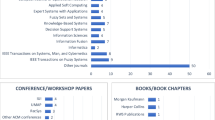Abstract
This paper considers a voting problem in which the individual preferences of electors are defined by the ranked lists of candidates. For single-winner elections, we apply the criterion of weak positional dominance (WPD, PD), which is closely related to the positional scoring rules. Also we formulate the criterion of weak mutual majority (WMM), which is stronger than the majority criterion but weaker than the criterion of mutual majority (MM). Then we construct two modifications for the median voting rule that satisfy the Condorcet loser criterion. As shown below, WPD and WMM are satisfied for the first modification while PD and MM for the second modification. We prove that there is no rule satisfying WPD and MM simultaneously. Finally, we check a list of 37 criteria for the constructed rules.
Similar content being viewed by others
References
Balinski, M. and Laraki, R., Majority Judgment: Measuring, Ranking, and Electing, Boston: MIT Press, 2011.
Bassett, G.W. and Persky, J., Robust Voting, Public Choice, 1999, vol. 99, no. 3–4, pp. 299–310.
Black, D., The Theory of Committees and Elections, Cambridge: Cambridge Univ. Press, 1958.
Brams, S.J. and Kilgour, D.M., Fallback Bargaining, Group Decis. Negotiat., 2001, vol. 10, no. 4, pp. 287–316.
Contreras, I. et al., A Class of Flexible Weight Indices for Ranking Alternatives, IMA J. Manage. Math., 2005, vol. 16, no. 1, pp. 71–85.
Fishburn, P.C., Paradoxes of Voting, Am. Polit. Sci. Rev., 1974, vol. 68, no. 2, pp. 537–546.
Fishburn, P.C., Monotonicity Paradoxes in the Theory of Elections, Discr. Appl. Math., 1982, vol. 4, no. 2, pp. 119–134.
Fishburn, P.C. and Brams, S.J., Paradoxes of Preferential Voting, Math. Magaz., 1983, vol. 56, no. 4, pp. 207–214.
Gaertner, W., Equity and Inequity-Type Borda Rules, Math. Soc. Sci., 1983, vol. 4, no. 2, pp. 137–154.
Gardenfors, P., Positionalist Voting Functions, Theory Decis., 1973, vol. 4, no. 1, pp. 1–24.
Gardenfors, P., Manipulation of Social Choice Functions, J. Econom. Theory, 1976, vol. 13, no. 2, pp. 217–228.
Good, I.J., A Note on Condorcet Sets, Public Choice, 1971, vol. 10, no. 1, pp. 97–101.
Hashimoto, A., A Ranked Voting System Using a DEA/AR Exclusion Model: A Note, Eur. J. Operat. Res., 1997, vol. 97, no. 3, pp. 600–604.
May, K.O., A Set of Independent Necessary and Sufficient Conditions for Simple Majority Decision, Econometrica, 1952, pp. 680–684.
McLean, I. and Urken, A.B., Classics of Social Choice, Ann Arbor: Univ. of Michigan Press, 1995.
Ozkal-Sanver, I. and Sanver, M.R., Efficiency in the Degree of Compromise: A New Axiom for Social Choice, Group Decis. Negotiat., 2004, vol. 13, no. 4, pp. 375–380.
Sanver, M.R. and Zwicker, W.S., Monotonicity Properties and Their Adaptation to Irresolute Social Choice Rules, Soc. Choice Welfare, 2012, vol. 39, no. 2–3, pp. 371–398.
Schwartz, T., Rationality and the Myth of the Maximum, Nous, 1972, vol. 6, no. 2, pp. 97–117.
Sertel, M.R. and Yilmaz, B., The Majoritarian Compromise is Majoritarian-Optimal and Subgame- Perfect Implementable, Soc. Choice Welfare, 1999, vol. 16, no. 4, pp. 615–627.
Smith, J.H., Aggregation of Preferences with Variable Electorate, Econometrica, 1973, vol. 41, no. 6, pp. 1027–1041.
Stein, W.E. et al., A Stochastic Dominance Analysis of Ranked Voting Systems with Scoring, Eur. J. Operat. Res., 1994, vol. 74, no. 1, pp. 78–85.
Tideman, T.N., Independence of Clones as a Criterion for Voting Rules, Soc. Choice Welfare, 1987, vol. 4, no. 3, pp. 185–206.
Tideman, N., Collective Decisions and Voting: The Potential for Public Choice, Farnham: Ashgate, 2006.
Woodall, D.R., Monotonicity of Single-Seat Preferential Election Rules, Discr. Appl. Math., 1997, vol. 77, no. 1, pp. 81–98.
Young, H.P., Social Choice Scoring Functions, SIAM J. Appl. Math., 1975, vol. 28, no. 4, pp. 824–838.
Zwicker, W., Introduction to the Theory of Voting, in Handbook of Computational Social Choice, Brandt, F., Conitzer, V., Endriss, U., Lang, J., and Procaccia, A., Eds, Cambridge: Cambridge Univ. Press, 2016.
Author information
Authors and Affiliations
Corresponding author
Additional information
Original Russian Text © A.Yu. Kondratev, 2017, published in Matematicheskaya Teoriya Igr i Ee Prilozheniya, 2017, No. 2, pp. 3–38.
Rights and permissions
About this article
Cite this article
Kondratev, A.Y. Positional Voting Methods Satisfying the Criteria of Weak Mutual Majority and Condorcet Loser. Autom Remote Control 79, 1489–1514 (2018). https://doi.org/10.1134/S0005117918080106
Received:
Published:
Issue Date:
DOI: https://doi.org/10.1134/S0005117918080106




